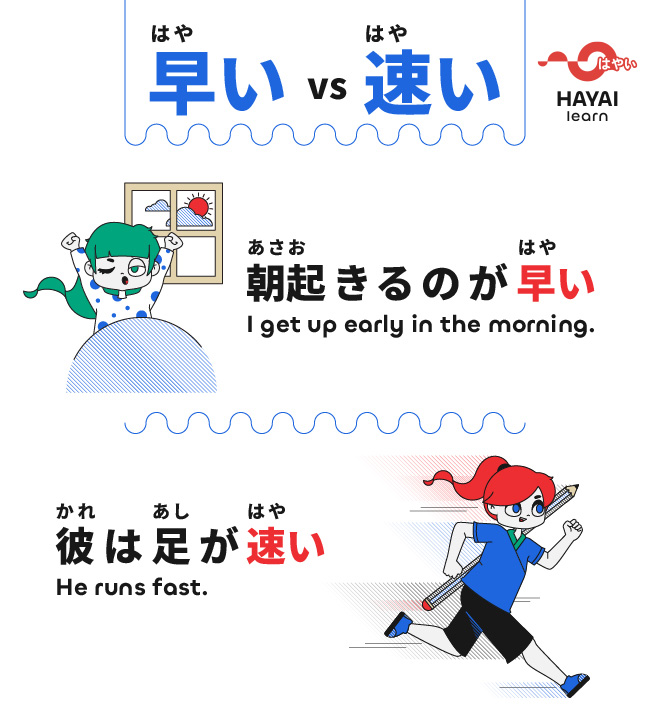Table of Contents
Intro
The difference between 速い (hayai) and 早い (hayai) is something that many people studying Japanese find difficult.
Even the Japanese often make mistakes.
Therefore, this article will thoroughly explain the meanings and usages of 速い and 早い so that you will not only avoid making mistakes between the two, but also learn idioms and conjugations.
This article is recommended for those who:
- want to know the difference between 速い and 早い
- want to know the correct use of 速い and 早い.
- want to know the idioms of 速い and 早い.
- want to know the conjugations of 速い and 早い
Let's get started!
Meaning of 速い and 早い

Now then, let’a get the meanings of 速い and 早い.
Meaning of 速い
速い is used when the time required to complete an action is short, the amount of work done in a given time is large, or the movement is fast. As in "彼は走るのが速い (He runs fast)" or "彼女は計算が速い (She's quick with her calculations.)"
In short, 速い is about speed.
TIP
The Kanji character "速" itself represents just speed. By combining this kanji with other kanji, we can express the speed of various things or how much speed it is.
Example
球速(Kyu-soku): Speed of a pitched ball
初速(Shosoku): Initial velocity
高速(Ko-soku): High speed
低速(Tei-soku): Low speed
Meaning of 早い
On the other hand, 早い is used when the timing is earlier than the reference time.
For example, use "あきらめるのはまだ早い(it is too early to give up)" or "お酒は15歳にはまだ早い(alcohol is too young for a 15-year-old)."
So, 早い is about timing.
TIP
It is explained that 早い is related to timing, but "素早い(Subayai)", using the same kanji, refers to the speed of movement.
Conjugated system of 速い and 早い
Let’s take a look at conjugated system of 速い and 早い .
速い and 早い are never used with verbs. Also, when used as adverbs alone, they are imperative.
Antonym of 速い and 早い
速い and 早い have different meanings, but their synonyms are both the same: 遅い(Osoi). 遅い is used for both slow speed and slow or late timing.
In addition to 遅い, ゆっくり(Yukkuri)is sometimes used. ゆっくり is more used as the synonym for 速い, which is about speed. However, in colloquial speech, ゆっくり is sometimes used as a synonym for 早い.
The conjugate systems are as follows:
Both are imperative forms if used in adverbs alone.
Example sentence of 速い and 早い
Then let's look at some examples.
Example sentence of 速い
Sentence starts at 1:11:00
Sentence starts at 2:56
Example sentence of 早い
Sentence starts at 8:40
Sentence starts at 8:15
Exercise for proper use of 速い and 早い
Now, let’s get some exercise for proper use of 速い and 早い.
Exercise1
First exercise is "速くボールを投げる (Hayaku bo-ru wo nageru)" vs "早くボールを投げる (Hayaku bo-ru wo nageru)"
If you use google translate, 速くボールを投げる will be translated as "throw the ball fast" and 早くボールを投げる will be "throw the ball quickly"
So what is the difference between the two?
速くボールを投げる(throw the ball fast)mentions speed, so this means throwing a high speed ball. On the other hand, 早くボールを投げる(throw the ball quickly)mentions timing, so it means that you take as little time as possible before throwing the ball.
Exercise2
Another exercise is "新幹線は車より速いです (Shinkansen ha kuruma yori hayai desu)" vs "新幹線は車より早いです (Shinkansen ha kuruma yori hayai desu)"
If you use Google translate, both of them would be completely the same: "The bullet train is faster than a car."
Is there any difference between the meaning or usage of these two Kanji?
Let's remember again that 速い represents speed and 早い represents timing.
"新幹線は車より速いです" only says bullet trains are faster than cars in the sense of speed. On the other hand, "新幹線は車より早いです" means bullet trains get you the destination faster than cars.
Therefore, "新幹線は車より速いです" cannot be phrased this way: "車は新幹線より速いです(Cars are faster than bullet train)" because physically that’s impossible. But "新幹線は車より早いです" can be phrased this way: "車は新幹線より速いです(Cars gets you the destinaiton faster than bullet train)" because it is often more accessible by cars.
Thus, if you understand the meaning of each, you will not make mistakes even in complicated phrases.
Idioms using 速い and 早い
Finally, here are some idioms.
There are no idioms using 速い, so only those using 早い are presented here.
Idioms using 早い:
- 話が早い(Hanasi ga hayai)- It's quick to understand and saves time
- 耳が早い(Mimi ga hayai)- Hear and know things quickly
- 足が早い(Ashi ga hayai)- Food that tends to spoil easily
Note that a single different kanji character can have a very different meaning.
Conclusion
Although 速い vs 早い is tricky to learn Japanese, just remember the following to avoid using it incorrectly:
- 速い is about speed
- 早い is about timing
You can find more example sentences from Youtube videos at www.hayailearn.com.
Have a good study!
